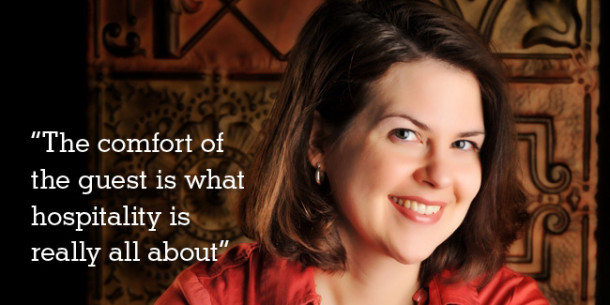
It had started out simple enough. My friend Mindelynn and I decided to host the holiday feast from my apartment near Washington, D.C. for my brother Jason, and my boyfriend Rob. Then we added four more guests, and decided to really let our domestic talents shine. One problem—we had only been out of college a couple years, and living in the nation’s fast-paced capital left little time to develop those domestic talents we were sure we had. Somewhere. To compensate, we started planning weeks in advance. During our lunch breaks we’d visit MarthaStewart.com looking for the perfect centerpiece, the proper table setting, ideas on creative place cards, etc. By Monday, the invitations had been sent, the groceries had been purchased, the crystal was washed and ready to go. I had even bought my first ever tablecloth and linen napkins for the occasion. On Tuesday, we learned of four additional guests: my boyfriend’s father, sister, niece and nephew who would drive up from Florida to meet me for the first time. I was convinced that their approval of me as suitable life partner for Rob would hinge solely upon my domestic performance. Now planning for a party of 12 (including seven out-of-towners and two children), Mindelynn and I began to panic. “We only have service for eight!” we fretted. “The turkey is too small! We need another table, more chairs! More food! More time! What do kids eat? We have no toys! Should we buy a ball?” Two days before Thanksgiving, I was void of all holiday spirit. What had begun as an adventure in hospitality seemed to take a turn toward an impossible standard and I was sure I was about to fail quite publicly. I know now what I didn't then: I had mistaken "entertaining" for "hospitality." In her book Isn't it Time for a Coffee Break?, author Amelia Rhodes describes the difference well:
Entertaining puts on a show with the hostess as the star, showcasing her home, her possessions, her cooking (or ability to hire a caterer), with the intention of impressing. It has no room for error and absolutely everything must be perfect. . . .The entertaining hostess wants to be seen for how put together she is, with the illusion that this is the way life always is. Hospitality is focused solely on the guest's needs and comfort. The hospitality hostess desires to express how much she values her guests, thereby showing how much God loves and values them. (pages 95-96)
As it turned out, there wasn't anything on the Martha Stewart website about this. Thankfully, we decided to turn to another source of advice: our moms. Instead of sharing our concern that we didn't have enough platters, space, or experience, they gently pointed out a few other things we didn’t have enough of: prayer, grace, compassion, peace and love. We were so wrapped up in the details of preparation that we neglected to focus on the well-being of our guests. The comfort of the guest, we learned, is what hospitality is really all about; and that depends upon more than the table setting and the food (no offense, Martha). It depends on our personal interaction with them. [Tweet "Rather than trying to impress our guests, we learned how to love them."] Rather than trying to impress guests, our moms taught us how to love them. Following Martha’s advice turned hospitality into a performance; but with the advice of our moms, hospitality became a ministry. Here are their top ten tips on caring for your company, the real heart of hospitality: 1) Pray for your guests before they arrive. 2) Create the seating arrangement according to what guests have in common with each other. 3) When your guests arrive, leave the kitchen preparations for 10-15 minutes while you welcome them. Let them help you in the kitchen if they want to, but if you are more comfortable working solo, tell them you’d rather they just relax. 4) Ask specific questions of the guests that are shy to help draw them out. 5) Bring up conversation topics that will include the majority of those present. Avoid topics that would stir up dissension among the group. 6) Enjoy yourself! If you are on edge, your guests will be, too. 7) Ask out-of-town guests if there are any amenities they need but left at home. 8) Use the comfortable environment you have created as a setting for sharing what God has done in your lives. 9) Encourage conversation even after the meal is finished. Move the group into the living room for more comfortable seating. 10) Send leftovers home with guests. They will feel cared for, and the food will serve as a reminder of the fellowship they had with you. I doubt that anyone who attended our Thanksgiving Feast that year recalls the color of the napkins or the centerpiece we created with cranberries and floating candles. But I do know they will always remember the day one tiny apartment held the fellowship and laughter of 12 people hailing from North Dakota, Philadelphia, Washington, D.C., Virginia and Florida. [Tweet "Hospitality is not a performance."] I’m no longer a 20-something with a career on Capitol Hill. I’m a 30-something homeschooling mom who would rather write books than fold the laundry, and I’ve had to seriously revise my definition of a presentable home. My instinct still leans toward the “put together” variety of hospitality, but my husband Rob reminds me it’s better to serve frozen pizza on paper plates with toys under the table than to not invite people into our home and lives until the house is clean (which is always “after the next book deadline”). He’s right. May our heart’s desire be not to simulate the pages of a magazine, but to listen to our guests, to share in their triumphs and struggles, even when the house is messy. After all, so is life.




Comments
Add new comment